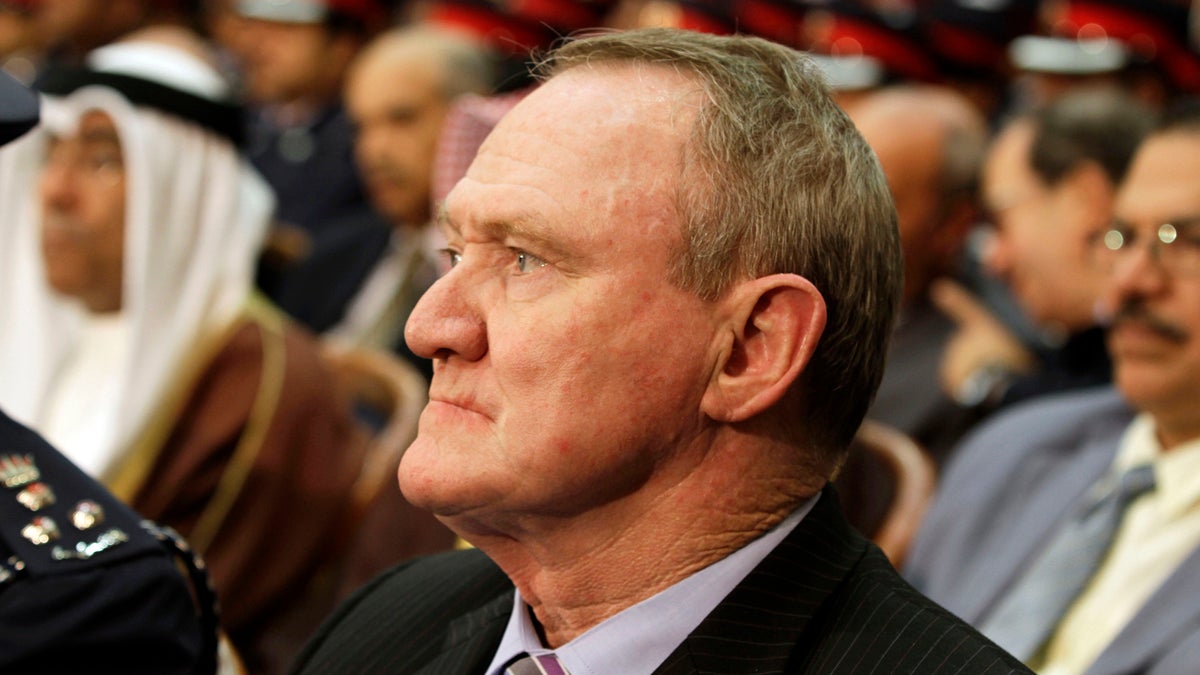Former Philadelphia Police Commissioner John Timoney dies of cancer at 68
Listen
Former Philadelphia Police Commissioner John Timoney
Former Philadelphia Police Commissioner John Timoney, one of the most renowned police officers of his generation, has died of cancer at 68.
Over the years, the Dublin-born cop acquired legions of fans and detractors for a style of policing that was both peaceful and harsh at times. Through it all, his big personality and tough talk were boosted by an impressive record of driving down violent crime — but offset by accusations of aggressive police tactics when confronted with mass demonstrations.
Timoney arrived in Philadelphia in 1998 following a nearly three-decade career with New York City’s police department, where he helped perfect the statistics-based method of policing known as Compstat, which has become a national model.
“The record should show that John Timoney brought modern-day policing to Philadelphia,” said former Gov. Ed Rendell who, as mayor, recruited Timoney to lead the city police department.
Rendell said Timoney reconfigured how cops spread out across the city, focusing more officers around crime hot spots based on statistical spikes in crime rather than trying to maintain consistent police-to-resident ratios.
A ‘cop’s cop’
He was only the third outside cop to lead Philadelphia’s police department since the 1920s. But because he was lauded as a “cop’s cop” with an effective track record of bringing down crime in New York City, the city’s leaders embraced him.
SEPTA Police Chief Thomas Nestel, who under Timoney was captain of the 14th District, remembered angst in the department over Timoney’s outsider status. That quickly dissipated, he said.
“What resonated throughout the department was that he was a cop. This wasn’t a banker coming to lead the department. This wasn’t a lawyer coming to lead the department. This was a cop,” Nestel said.
Timoney walked into the city during a relentless crime wave with a murder rate that had not dropped in years.
At that time, he bragged to reporters that he was such a fast runner that he’d make sport of letting bad guys go just so he could chase them down again.
Timoney was indeed an avid runner who completed more than a dozen marathons.
Lynn Abraham was district attorney when Timoney brought his numbers-based policing and his mix of Irish charm and toughness to Philadelphia.
“His heart was in policing. And he was a super terrific, honest, fearless police officer at a time when it, when we really needed it,” Abraham said.
Putting community, patrol officers first
Before Timoney, Philadelphia’s police department, and many others around the country, often had a default setting of sharing as little information with the public as possible, yet Timoney helped move the conversation the other way, Nestel said.
“Policing for decades didn’t like to share data or information. He opened the door for that, Nestel said. “And there are a lot of positive things that have come from critical evaluation of policing.”
Another aspect of Timoney’s leadership was his high regard for patrol cops over their supervisors, district captains or commanders.
Nestel’s first encounter with Timoney was a classic example.
“I went to a meeting in my district, that was the first time I had an opportunity to meet him,” Nestel said. “And I saluted him and said, ‘Welcome to Philadelphia,’ and he walked right past me. He wanted to talk to people in the community and cops. He didn’t want to talk to commanders.”
Long a champion of nonlethal force, Timoney had the department swap their batons for pepper spray. Abraham remembered that Timoney often rode his police bike around neighborhoods to get to know residents — and also to look for recruits.
“He did not sit in his office. He was a definite factor in making sure there were connections between the police department and the communities. He was a tough guy,” Abraham said. “He didn’t take any nonsense from anybody.”
Crackdown on RNC protesters widely criticized
He had to answer sharp criticism after overseeing the aggressive crackdown on demonstrations during the Republican National Convention in 2000, when more than 400 protesters were arrested and many groups were infiltrated and spied on with the help of Pennsylvania state troopers.
Kris Hermes, who wrote a book about police conduct during the 2000 RNC, said Timoney’s leadership during that time was watched carefully by other law enforcement agencies.
“Even to this day, there is an aggressive policing model that is used that is largely developed on the streets of Philadelphia,” Hermes said.
“Arresting them en masse. Keeping them in jail, sometimes preventively detaining them by imposing high bail,” he said. “Definitely the tactic is to clear the streets and deal with the consequences afterwards.”
That reputation followed Timoney to Florida, where he caught heat for his treatment of protests during the Free Trade Area of the Americas in Miami in 2003, the same year his police leadership there started.
He had cops in body armor fan out across the protest areas. There were many dozens of pre-emptive arrests, and police infiltrated demonstrator meetings. The tactics became known as “The Miami Model.” More than 300 were arrested during the event, and the ACLU and others filed suits alleging abusive police tactics.
‘Natural born charmer with a lot of courage’
But in Philadelphia, Abraham said, most in the law enforcement community remember Timoney fondly.
“People tend to see things and remember things the way they want to best reflect what they think,” Abraham said. “I think John Timoney was a revolutionary force in this community about how police should respond to crime on the street and how police should treat people.”
Abraham said Timoney came to Philadelphia on the heels of the “disastrous reign” of Police Commissioner Richard Neal, who resigned before then-Mayor Ed Rendell appointed Timoney.
“Timoney will be remembered, frankly, for reshaping the force,” Abraham said.
After his stint overseeing Miami’s police department, Timoney did security consulting work in the Middle East. Following that, he returned to a South Florida rehabilitation center for treatment.
“Voice completely gone,” Timoney, wrote in July when contacted for comment on a story last month. He was battling late-stage lung cancer.
At all of his command posts, Timoney championed nonlethal force, most famously in Miami.
There, at a press event kicking off a new Taser stun gun program, he took a stun in the chest, with television cameras capturing the whole thing.
To Rendell, Timoney’s most salient quality will always be his uncanny ability to win people over, even enemies.
“He could charm business leaders. He could charm society debutantes. He could charm everybody. He also could charge politicians. He was great with City Council. He was great dealing with people in the state Legislature,” Rendell said. “He was a natural born charmer with a lot of courage, a lot of grit and a lot of vision.”
WHYY’s Dave Davies contributed to this report.
WHYY is your source for fact-based, in-depth journalism and information. As a nonprofit organization, we rely on financial support from readers like you. Please give today.




